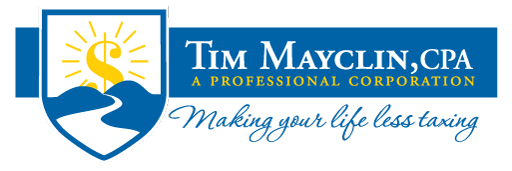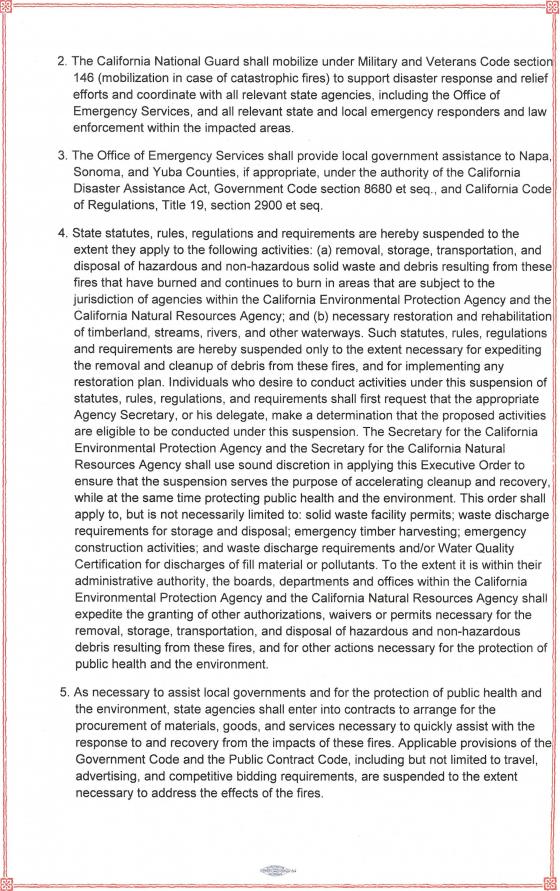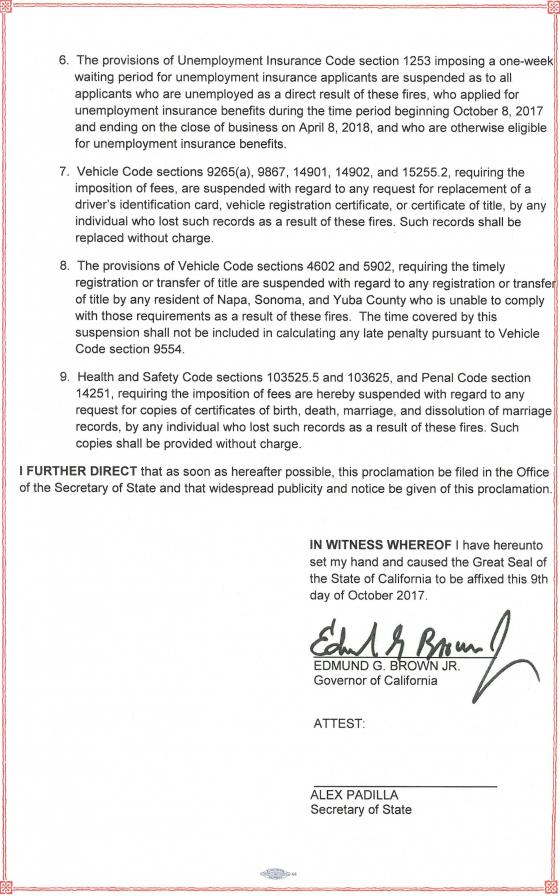Tim Mayclin is CPA serving Santa Rosa CA, located in Rohnert Park, specializing in Business Tax Planning and Strategy.
Making your life less taxing.
Realize the peace of mind that comes from:
- Having a reputable and trustworthy accounting firm so that you are able to focus on the important issues involved in running your business. Tim Mayclin, CPA is an accountant serving Santa Rosa CA, Petaluma, Novato, Sebastopol, Rohnert Park, Cotati and Wine Country California areas.
- Getting reliable advice to help you strategically build a strong financial foundation for your Sonoma County California business.
- Knowing your accounting firm in California is handling the many requirements that governmental agencies demand in a timely manner.
California Wildfire Update – How It Affects Your Finances
Employers May Provide Tax-Free Relief To Employees Hit By Storm, Attorney Says
Employers can provide benefits, tax-free, to employees who are victims of a federal natural disaster under tax code Section 139 and Internal Revenue Service guidance.
Section 139 provides that, in the case of a presidentially declared disaster, an employer can give cash or benefits to assist employees. The payments are exempt from federal income tax and employment taxes, no substantiation is required from the employees, and the employer is able to deduct the payments, Ruth Wimer, a partner at McDermott Will & Emery in Washington, D.C., told BNA.
“There is essentially no administration involved for the employer to be able to take advantage of this type of plan,” she said.
Wimer said the ease in providing relief to employees makes it very attractive to employers and “thus fulfills the role of Congress in enacting this relief.” In considering whether to provide disaster relief for employees in a designated area, employers should consider who will be covered under the program and the period of coverage, Wimer said.
The Victims of Terrorism Tax Relief Act added Section 139 to the tax code in 2001. Section 139(a) provides that gross income does not include any amount received by an individual as a qualified disaster relief payment.
Qualified Disaster Relief Payment Defined.
Section 139(b) defines, in part, “qualified disaster relief payment” to mean any amount paid to or for the benefit of an individual:
• to reimburse or pay reasonable and necessary personal, family, living, or funeral expenses incurred as a result of a qualified disaster;
• to reimburse or pay reasonable and necessary expenses incurred for the repair or rehabilitation of a personal residence; or
• to reimburse or pay reasonable and necessary expenses incurred for repair or replacement of the contents of a personal residence, to the extent that the need for such repair, rehabilitation, or replacement is attributable to a qualified disaster.
A personal residence can be one that is rented or owned, according to IRS Publication 3833.
In addition, Section 139(b)(4) provides that a qualified disaster relief payment also can be an amount paid by a federal, state, or local government, or agency or instrumentality thereof, in connection with a qualified disaster, in order to promote the general welfare.
In Revenue Ruling 2003-12, IRS said the exclusion for payments made under Section 139(b)(4) is in addition to the administrative general welfare exclusion for certain disaster relief payments to individuals, citing earlier revenue rulings relating to payments from social benefit programs.
Under Section 139(b), the amounts will be excluded from income only to the extent that any expense compensated by the disaster relief payment is not compensated for by insurance or otherwise.
Income replacement payments, such as payments of lost wages, lost business income, or unemployment compensation are not qualified disaster relief payments.
Qualified Disaster Defined.
In general, Section 139(c) provides that the term “qualified disaster” means:
• a presidentially declared disaster (defined generally, as a disaster in an area that has been subsequently determined by the president to warrant federal assistance under the Disaster Relief and Emergency Assistance Act),
• a disaster resulting from any event that is determined by the secretary of the treasury to be of a catastrophic nature,
• a disaster resulting from terrorist or military actions, or
• a disaster resulting from an accident involving a common carrier.
Rev. Rul. 2003-12 quotes the Joint Committee on Taxation’s Technical Explanation of the Victims of Terrorism Tax Relief Act of 2001 to explain why there is no substantiation requirement connected to receipt of the relief.
According to the technical explanation, because “of the extraordinary circumstances surrounding a qualified disaster, it is anticipated that individuals will not be required to account for actual expenses in order to qualify for the [§ 139] exclusion, provided that the amount of the payments can be reasonably expected to be commensurate with the expenses incurred.”
In the revenue ruling, IRS builds on this explanation by providing three situations in which payments to disaster victims are analyzed for their exclusion under Section 139.
For employers, the pertinent example is Situation 3. In Situation 3, IRS said, “Payments that employees receive under an employer’s program to pay or reimburse unreimbursed reasonable and necessary medical, temporary housing, or transportation expenses they incur as a result of a flood are excluded from gross income under section 139.”
In addition, the revenue ruling held that amounts that are excluded from gross income under Section 139 are not subject to information reporting under Section 6041
For more information about how you may be financially affected by the California Wildfires, contact Tim Mayclin, CPA, an accountant serving Santa Rosa CA and the Sonoma County.
For those that suffered a loss due to the fires in California
Property taxes. Temporary property tax reductions are available for homes destroyed or damaged by fire. The property owner must apply to the County Assessor within one year from the date of the fire for tax relief.
This relief is available for all property where value is reduced more than $10,000 by a fire, not just property in the wildfire areas.
For people who live in counties where Governor Brown has declared a state of emergency, fire victims can apply for a deferral of their next property tax payment without penalties or interest. To date, this list includes Butte, Lake, Napa, Nevada, Orange, Solano, Sonoma, and Yuba counties.
The Sonoma County Assessor announced, working with CAL Fire and local fire departments, it will reduce taxes for damaged properties without taxpayers needing to apply. It hopes to have corrected 2017-2018 property tax bills to property owners by Dec. 11, 2017. In Sonoma County, affected taxpayers will have a 30-day deferral period following receipt of a corrected tax bill. Taxpayers with impound accounts should contact their lender to inform them of the change in status of their property.
Mortgage payments. Mortgage payments are still due for a destroyed or damaged home. But, most lenders will give a 90-day postponement of payments. Contact the lender for assistance.
Do I really need a CPA?
It is tax season, money is tight, and you are not looking to find out whether or not your income is recession proof or not. So what is the best way to get your taxes done without breaking the bank? Is it more financially beneficial to use a tax preparation service or should you use a Certified Public Accountant (CPA)?
Although we probably don’t spend much time looking to define our financial status, research shows that what is considered to be middle class America and people who are considered to be on the poverty line, tend to use tax services when filing their taxes each year rather than a CPA. I wonder how many people stop to compare what the fee for one is verses the other. At the end of the day, it seems that without researching cost and benefit, people default to tax preparation services over using a CPA. As a small business owner I’d like to shed some light on why you should use a CPA instead.

5 Things a CPA firm can do for your business
Businesses – whether they are nonprofit, public, or private – have plenty to take care of. There are the day-to-day duties of interacting with customers, as well as making the important decisions that drive the company’s mission and determine policies. Ultimately, though, every business or organization needs to keep track of its finances. That’s where CPA firms come in. Tim Mayclin, CPA, an accountant serving Santa Rosa CA, can perform all of the following duties and more:

- Auditing
An audit is one of the most frequently conducted processes done by a CPA firm, because it can be utilized by all three types of businesses – nonprofit, private, and public. Read More…
- Information technology
A CPA firm can help a business transfer its financial records from outdated technology to more up-to-date systems, and can organize this in a way that is easily accessible to the head of the company and others who have access. Read More…
- Forensic accounting
Forensic accounting combines investigative procedures with accounting in order to determine if fraud or embezzlement is taking place, and its findings are used in legal proceedings if they occur. Read More…
- Consulting
“Consulting” is a very broad term that covers everything CPA firms do to advise businesses in areas from human resources to management. Read More…
- Financial planning
Areas such as savings and investments, future income and expenses, and loans and credit are managed by a CPA firm’s financial planning services. Read More…
To learn more about how Tim Mayclin, CPA, an accountant serving Santa Rosa CA and Rohnert Park can help your business, call 707-584-1040



